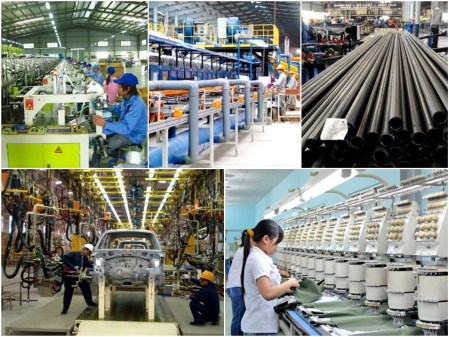The growth, higher than the 8.2 percent in the same period last year, was mainly fueled by crude oil production, which expanded by 510 percent and 520 percent in June and July respectively, compared to last year’s corresponding period.
The GSO attributed the oil sector’s strong IPI rise to the opening of the Nghi Son Oil Refinery and Petrochemical complex – the country’s largest of its kind – in the Central province of Thanh Hoa in June and another, Binh Son, in Central Quang Ngai province – which resumed operations in the same month after annual maintenance.
    |
 |
|
Photo for illustration: sonla.gov.vn |
Some sectors in the secondary industry (dominated by the manufacturing of finished products) also saw high growth, such as coal production, up 120 percent; refined oil production (up 60 percent), mineral mining support services (up 39 percent ), electronics, computers and optical products (up 18 percent) and pharmaceuticals (up 17.5 percent).
Many primary products rose substantially against the same period last year, including oil and gas (up 51 percent); handsets components (up 37 percent); liquefied petroleum gas (up 25 percent) and televisions (up 22 percent). Other items included synthetic fibers (up 21 percent); refined sugar (up 18 percent) and seafood feed (up 17.6 percent).
However, some products saw slight declines in production due to lower demand, such as mobile phones (down 2.3 percent) and urea fertilizer (down 3 percent).
Among localities recording higher growth in industrial production against 2017’s corresponding period, the northern port city of Hai Phong led with growth of 24 percent. It was followed by four other northern provinces of Bac Ninh, Vinh Phuc, Thai Nguyen and Hai Duong with respective rises of 20 percent, 14 percent, 12 percent and 9.3 percent. Meanwhile, Hanoi and HCM City witnessed a modest IPI increase of 7.5 percent.
As of August 1, the number of laborers in the industrial sector increased 3 percent from the same period last year, with a 1 percent rise in the State-owned sector, 3.2 percent in the non-State-owned sector and 3.5 percent in the foreign-invested sector, the GSO said.
Earlier, the GSO predicted the IPI may slow down in the rest of this year, reflecting the increasing importance of sustainable development.
The office recommended strengthening connectivity among businesses and the enhancement of their capacity to join supply chains, thus making industry grow more sustainably.
It is necessary to continue reducing business conditions, simplifying administrative procedures, enhancing the quality of online public services and using advanced technology to boost the growth of industry.
The office also stressed the need to handle stagnant and ineffective projects by the end of 2018, thus giving more resources to the development of industry.
Source: VNA